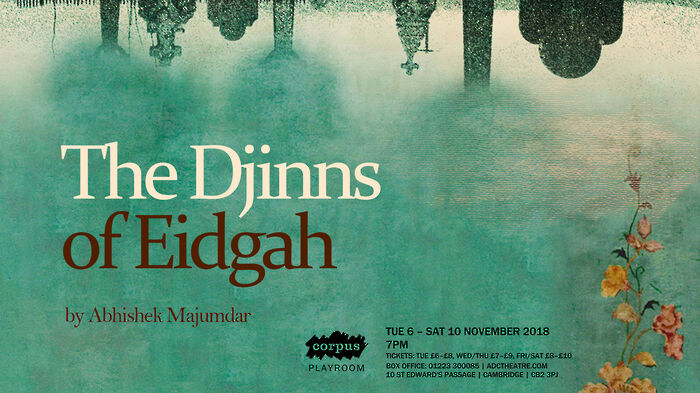The Ladies review
This nuanced piece of student writing crosses the sacred boundary that is the door of the ladies’ bathroom: and the results are wonderfully colourful

Bumping into school friends in a pub somewhere once you’ve left school and you all have separate lives, is an inevitability. For some, it’s a joy and a pleasurable surprise; others dread it and will avoid it for as long as they can. It is in this liminal space of reunion and re-stirring of half-buried feelings that Alice Tyrrell sets her new play ‘The Ladies’, which takes place over one night inside (and in the corridor just outside the door of) the ladies’ bathroom.
“I wonder what goes on in there,” muse the play’s only two male characters, separated from their girlfriends and exiled to the corridor by the necessity of gender. The first act shows Ella’s boyfriend Harry (Freddie Bartlett-Evans) passed by a wonderful array of characters as he waits outside the door of the bathroom, and the conversations that take place are marvellously awkward both in their writing and their execution. There is a naturalism to Bartlett-Evans’ acting which nicely complements the words of Tyrrell’s script; all the silences come in just the right places. This first act bursts with humour, sometimes chuckling and sometimes roaringly hilarious but always keeping the audience close to these characters.
We are physically close, too, as a wall stands only a couple of metres in front of the first row of seats, pasted with concert posters which evoke the pub setting but also become a kind of cruel joke for Harry, whose stagnated career as a musician haunts him through every encounter. The set is pleasingly minimalist and yet brightly atmospheric, providing a rectangle of colour and interest in the middle of the grey space of Pembroke New Cellars.
On the surface, then, the first act of ‘The Ladies’, beautifully crafted as it is, has little relation to queer theatre. It is in the second act, after the audience have stepped through the doorway and entered the once-secretive space of the ladies’ bathroom in an exciting piece of staging that the queer focus of Tyrrell’s creation comes to the fore.
"This first act bursts with humour, sometimes chuckling and sometimes roaringly hilarious but always keeping the audience close to these characters"
The hidden is unveiled; the mystery is clarified. Here the women are left to interact outside the gaze of men, and the range of relationships that Tyrrell explores give the scenes a vibrance and an intensity that is skilfully navigated by the actors. A special mention (which is hard to do in such a talented cast) should go to Kay Benson, whose performance as the pouting, hair-twiddling Jess creates a character almost uncomfortably sassy and yet so real. The gossiping drama of Jess and Poppy (Vee Tames) contrast with the cynicism of Freya (Fran Davis) who comes to centre stage in this act. She is the ‘other woman’, the girl Ella (Hannah Lyall) is trying to avoid with all her might because she doesn’t want to hurt Harry – but mostly because she cannot admit to herself her attraction to Freya.
Lyall and Davis bounce off each other with a simple quietness in their interactions, as Ella’s bubbly expressiveness comes up against Freya’s quiet knowing. If there is one part of this play which did not work for me, it would be Freya’s outburst; while its message was an important one, it seemed too abrupt, too compressed, which was a shame at the end of a play which is so tightly-constructed, with half-hearted comments from the first act taking on new meaning in the second. Ella’s response, however, when Harry finally breaks the magical line and enters the bathroom to find Ella and Freya there, is breathtaking. Tyrrell and Blackburn’s directing here is perfect, as they have Lyall facing each of the two in turn, speaking in the third person as if she cannot quite face up to what she is saying: she cannot quite take ownership of the pain that she is causing. The ending is perhaps a little abrupt, but it is certainly moving, and its foregrounding of queer issues is incredibly powerful.
Yet what makes this show so heartbreaking and so wonderful to watch is not just its queer message. It is the humanity of its characters, whose interactions are performed with a subtlety and naturalness that is difficult to perfect: but when it works is enlightening and riveting. To have written something so nuanced and cleverly-crafted, with its layers of meaning running from the first to the last second, is such an exciting achievement, and the cast and staging more than do the words justice.
 Features / Should I stay or should I go? Cambridge students and alumni reflect on how their memories stay with them15 December 2025
Features / Should I stay or should I go? Cambridge students and alumni reflect on how their memories stay with them15 December 2025 News / Cambridge study finds students learn better with notes than AI13 December 2025
News / Cambridge study finds students learn better with notes than AI13 December 2025 News / Dons warn PM about Vet School closure16 December 2025
News / Dons warn PM about Vet School closure16 December 2025 News / News In Brief: Michaelmas marriages, monogamous mammals, and messaging manipulation15 December 2025
News / News In Brief: Michaelmas marriages, monogamous mammals, and messaging manipulation15 December 2025 Comment / The magic of an eight-week term15 December 2025
Comment / The magic of an eight-week term15 December 2025









